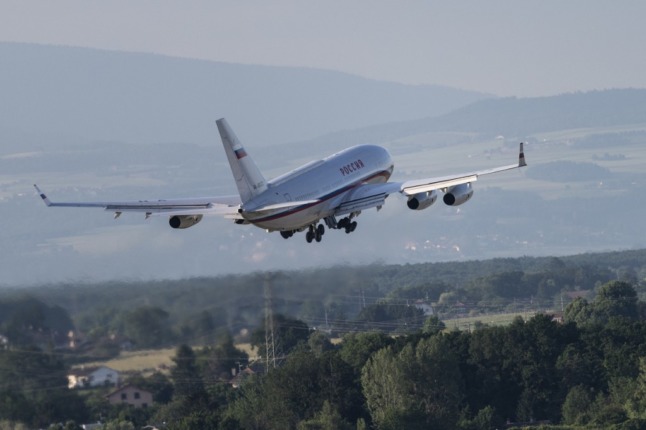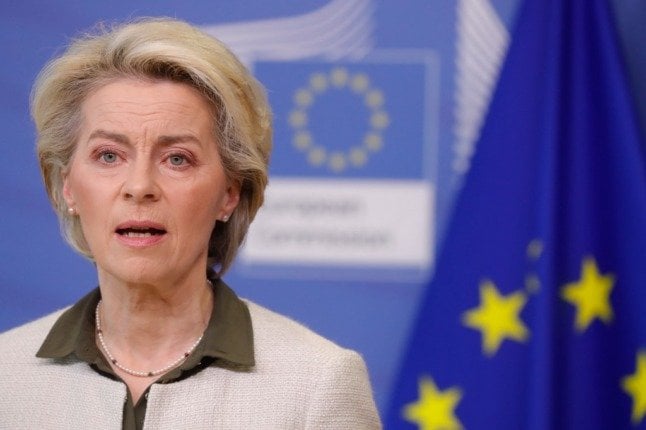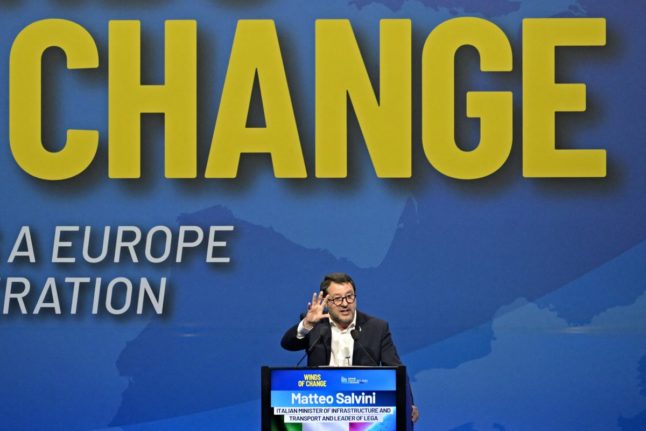European Commission President Ursula von der Leyen announced further measures on Sunday, adding further pressure on Russia on top of previous economic sanctions in response to their invasion of Ukraine.
Her full statement did not go into much detail on exactly how the new rules will apply.
It’s likely that there will be further clarifications in the days to come, but here’s what we know so far.
Visa rules
EU member states will discuss on Monday using a little-known rule called the Temporary Protection Directive to allow Ukrainians to stay within the Bloc for up to a year without a visa.
Since 2017, Ukrainians have benefited from the 90-day rule, which means they can spend 90 days out of every 180 in the EU or Schengen zone without needing a visa.
“We need to be prepared for day 91,” EU home affairs commissioner Ylva Johansson said on Sunday.
This change would not affect entry to the Bloc – the 90-day rule means that Ukrainians can already enter without having to show a visa – but once here they would not be required to make an application for asylum.
Ursula von der Leyen said: “We welcome with open arms those Ukrainians who have to flee from Putin’s bombs and I am proud of the warm welcome that Europeans have given them.
“We are mobilising every effort and every euro to support our Eastern Member States – to host and take care of these refugees.”
Speaking at European Interior Affairs Council in Brussels on Sunday, Italy’s Interior Minister Luciana Lamorgese said Italy was ready to play its part in accommodating refugees.
“For me, solidarity has always been a staple of our European agenda, and now even more so, we will offer maximum solidarity to a people who are suffering,” Lamorgese reportedly said, adding that Italy was prepared to accept additional refugees via EU redistribution quotas.
Flight ban
Russian-owned, Russian-controlled or Russian-registered planes are now barred from all EU airspace, including the airspace over Italy. They will not be able to take off or land anywhere in the EU, or fly over EU airspace. This includes commercial airlines and private jets.
There is, however, no travel ban on Russia, so people can still travel between Italy and Russia on either a non-Russian airline or by road, rail or sea. On Monday Russia announced a reciprocal ban on the airlines of 36 countries, including Italy. However most European airlines had already suspended routes to and over Russia.
Italy’s Covid-related travel rules change on March 1st to allow people to enter from any country without a quarantine requirement provided they show any of a valid vaccination or recovery certificate or a recent negative test result. Italy does not recognise the Russian Sputnik vaccine.
Until then, Russia remains on Italy’s ‘Rest of World’ List E. People can only travel to Italy from these countries for an essential reason (having Italian citizenship or residency counts as an essential reason to travel), must present a recent negative test result to enter, and are required to quarantine for ten days on arrival.
Italy has advised all its citizens living in Russia to leave by any commercial means available.

SWIFT/Russian central bank sanctions
If you have any financial dealings with organisations or individuals in Russia, these could become difficult in the coming days.
The EU has agreed to disconnect Russia from the Swift network, which is a communications network used for making international money transfers, and von der Leyen also announced sanctions on Russia’s central bank.
Shipping ban
If you have recently ordered anything from Russia you may find there are delivery issues even if your payment goes through without problems.
Italy came under criticism last week after some UK and US media outlets reported that it been pushing to keep its lucrative trade in luxury goods out of EU discussions on economic sanctions against Russia.
Italian Prime Minister Mario Draghi has since reiterated that Italy is “fully aligned” with its European partners on the issue, pledging a “very tough package of sanctions against Russia” in a speech to the national parliament on Friday.
Economic sanctions mean that certain cargo from Russia can be seized or blocked from entering the EU. Over the weekend French customs officers intercepted and halted a ship in the French port of Boulogne-sur-Mer whose cargo was destined for St Petersburg.
Russia Today ban
The EU has also banned Russian state media outlets including Russia Today (RT), Sputnik and their subsidiaries. Exactly how this will work is not yet clear, with Von der Leyen announcing that the EU is “developing tools to ban their toxic and harmful disinformation in Europe”.
Asset seizures
On February 12th, the Brescia prosecutor’s office issued an asset seizure notice to Lanfranco Cirillo, an Italian architect thought to have designed ‘Putin’s Palace’ on the Black Sea.
Paintings by Picasso, Cezanne, Mirò and Chagall are reportedly among the 143 artworks that have been confiscated by the authorities, as well as a helicopter that Cirillo reportedly pilots himself. Following an investigation that has been ongoing since 2021, Cirillo stands accused of tax evasion, laundering his own money and violating Italy’s cultural assets protection code.
44 Russian oligarchs are also under investigation in Brescia, according to the Corriere della Sera news daily.
Price rises
Previously announced economic sanctions on Russia are likely to lead to price rises throughout Europe, particularly for oil, gas and petrol.
Italy’s heavy dependence on gas means that it stands to be particularly negatively affected by stopping gas exports from Russia to Europe.
Italy is the second-largest natural gas importer in Europe after Germany, importing 90 percent of its gas supply with 45 percent of that coming from Russia – up from 27 percent ten years ago.
Unlike neighbouring Germany and France, Italy has no nuclear power capability. The country had also begun to phase out coal power, closing three plants in 2020 and 2021; a move which Prime Minister Mario Draghi is now considering reversing.
Eurovision
And if you’re a Eurovision fan, don’t expect to see a Russian entry at the contest in May, the European Broadcasting Commission has announced that Russia is barred from the 2022 event.



 Please whitelist us to continue reading.
Please whitelist us to continue reading.
Russia Today and Sputnik still available to us online. Blocking Russian propaganda has not been accomplished. 1 March, 13:16pm.